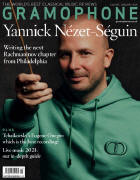Texte paru dans: / Appeared in: |
|
|
Outil de traduction (Très approximatif) |
|
|
Reviewer:
Charlotte
Gardner On to the content, and it’s hard to single out highlights when the programme is not only built almost entirely of premiere recordings – there’s one exception – but also performed with such multicoloured finesse. That said, be sure to keep your ears especially peeled throughout Janitsch’s Trio Sonata in G – a work far beyond the technical reaches of the average amateur musician with its seventh-position passagework, over which Pramsohler and Bernabé are exquisite as they lightly curl their slender lines around each other, set off further by the lovely overall balance between all four musicians. Likewise, there’s the close duetting and expressivity their violins bring to Melancholicus & Sanguineus, the musical conversation between two contrasting characters penned by Frederick’s opera orchestra concertmaster, Johann Gottlieb Graun, which served as the model for CPE Bach’s own famous Sanguineus & Melancholicus. Or, if you want to admire what a sensitive and superglued unit Choï and Grisvard are, it’s particularly pleasurable to pick out their underpinnings over Johann Abraham Schultz’s Trio Sonata in A minor, for which Grisvard is on a reconstruction of a special Gottfried Silbermann fortepiano whose ivory strips hitting the strings mimic the sound of a dulcimer. In short, another city to savour. |
|




